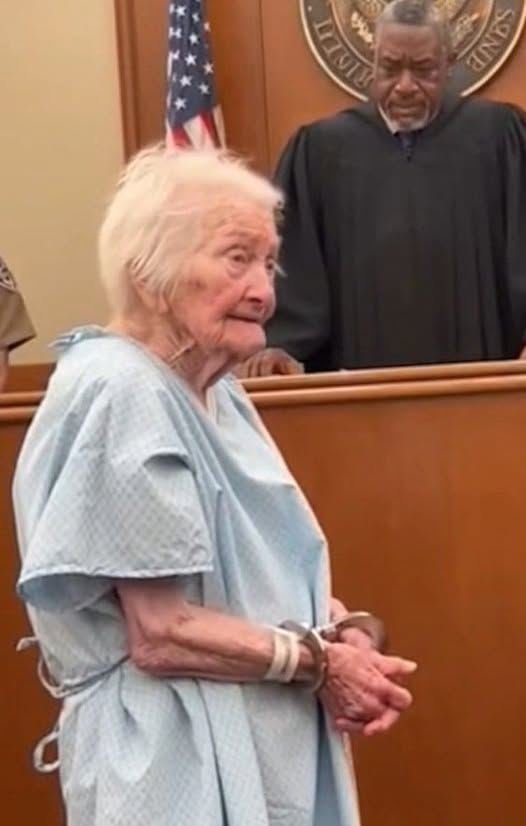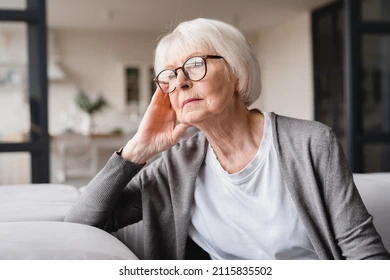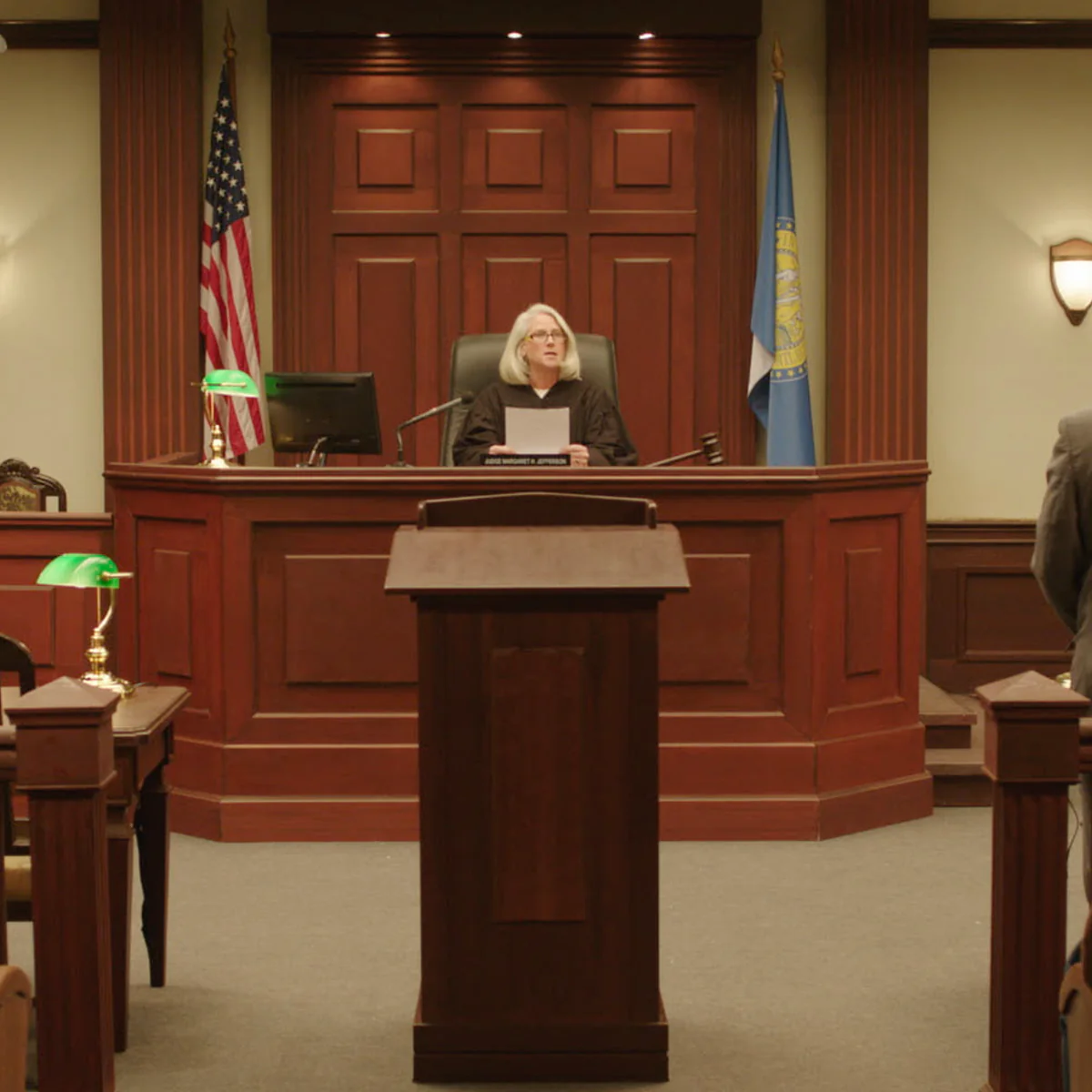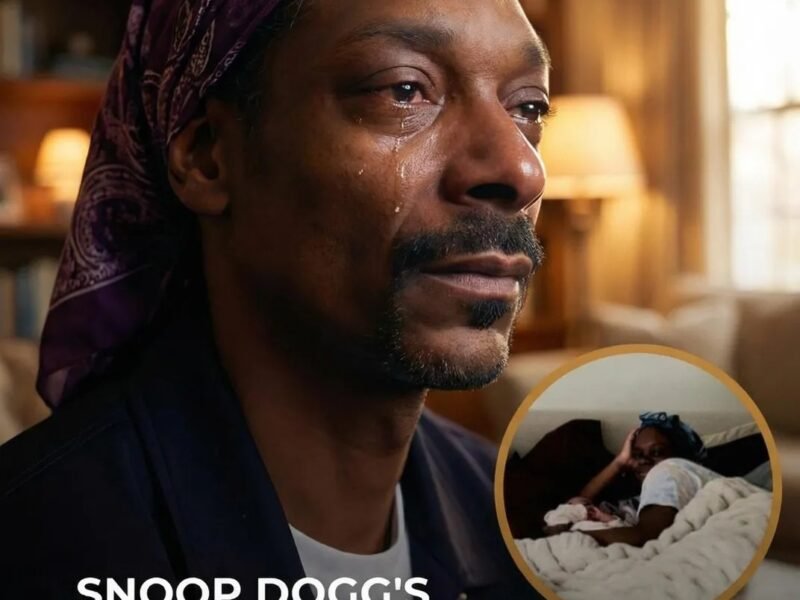In a moment that shocked the world, a 91-year-old woman stood in a courtroom, frail and shackled, her hands trembling as she faced felony theft charges. The image of Helen Miller, a small elderly woman, standing in front of a judge in a hospital gown, would become the emblem of something much larger—a broken system that had failed not just her, but millions of others in similar situations. What led to this moment wasn’t just a criminal act, but a desperate act of love—love for her husband, George, who was battling severe heart failure.
Helen’s story is not just about the theft of medication; it’s a reflection of the vulnerability of the elderly, the inadequate healthcare system, and the heartbreaking choices that people like Helen are forced to make when they’re left with no options. It’s a tale that should make us all ask: what happens when the system fails those who need it most?

Section 1: Helen’s Love for George—A 65-Year Journey
Helen and George Miller’s love story stretches over 65 years. Through the decades, they built a life together—a life filled with shared memories, small joys, and the quiet bond that comes with enduring love. Helen and George were not wealthy, but they had something more precious—each other. They learned to survive, to make do with what they had, and always found ways to make their love a priority.
Their daily life revolved around George’s severe heart failure, a condition that required constant care. Helen, now 91, was George’s primary caregiver. He needed 12 different medications each day, and every action of Helen’s life was coordinated around this constant need for medication and medical attention. They lived frugally, their income limited to social security and what little they could make from small, sporadic savings. But no matter how much they cut back, their lifestyle was always on the edge.
Their marriage was built on sacrifice, understanding, and love. But as the years passed, Helen knew time was not on their side. George’s condition worsened, and the burden on Helen became even greater. She knew every day might be the day George’s health would take a sudden turn. And yet, she never wavered in her commitment to him.

Section 2: The Triggering Event—A Pharmacy Visit Gone Wrong
Helen’s nightmare began one fateful morning when she went to the pharmacy to pick up George’s medication. For months, the Millers had managed to pay the $50 co-pay for George’s prescriptions. But when Helen approached the counter that day, the pharmacist informed her of a shocking new price—$940. She was stunned. The lapsed supplemental insurance, a result of missing a payment they could not afford, had led to this overwhelming amount. There was no way they could pay it.
Helen stood there, helpless, holding the prescription in her hands. George’s life depended on those medications, but she couldn’t afford them. It was a gut-wrenching moment. She walked out of the pharmacy, empty-handed, knowing that without the medicine, George’s health would deteriorate further. For the next three days, she watched him struggle, his breath growing shallow, his body weak and confused. Every moment was filled with dread.

Section 3: The Act of Desperation—A Cry for Help
With George’s condition worsening by the hour, Helen found herself faced with an agonizing choice. She knew George had only days left without his medication. In her mind, she weighed the value of a life—a life filled with memories of love and care—against a broken system that had left her with no recourse.
Terrified and desperate, Helen returned to the pharmacy, but this time, she didn’t just ask for the medication. As the pharmacist turned away, her hands shaking uncontrollably, she made a decision no one should ever have to make. She took the boxes of pills—boxes that could save her husband’s life—and slipped them into her purse.
Helen knew she couldn’t afford to pay, but her love for George was enough to push her to act. Her mind clouded with fear, and all she could think about was getting him the medicine he needed. Unfortunately, she never made it out the door.
The store manager stopped her at the sensors, and soon, the police were called. Helen, overwhelmed with guilt and fear, was arrested for felony theft. Her blood pressure skyrocketed during booking, and she had to be rushed to the hospital. Her world, which had been built on love and duty, was now falling apart.

Section 4: The Courtroom Moment—Compassion and Justice
The next morning, Helen was brought to court, still in her hospital gown. Her frail wrists were shackled, and she stood before the judge, trembling. The sight was heartbreaking. The judge, Marcus, looked at the charges and then at the tiny, vulnerable woman before him. His face softened as he read the details. A 91-year-old woman charged with felony theft—this wasn’t just a failure of Helen; it was a failure of the system that had failed her.
“Helen Miller, you are not a criminal,” Judge Marcus declared, his voice thick with emotion. “This is not a case of theft. This is a failure of our system, one that leaves people in situations where they have no other choice.”
In a rare moment of true justice, the judge dismissed the charges against Helen immediately. But that wasn’t all. He called for an immediate recess, ordering that Helen be sent back to the hospital and that she would not be billed for her care. He also instructed his clerk to call the social work department, ensuring that Helen and George would receive the emergency assistance they needed.

Section 5: Systemic Failures—The Cost of Medical Inequality
Helen’s case may have been resolved in the courtroom, but it raises a critical issue: how many people like Helen and George are there? In America, where healthcare costs continue to rise, millions of elderly people on fixed incomes struggle to make ends meet. This system, designed to care for the sick, has become a system that too often neglects the very people it was built to protect.
The high cost of medication, especially for the elderly, is a significant issue in the United States. Many seniors, like Helen, are caught in the cycle of poverty and illness, unable to access the healthcare they desperately need. The inability to afford basic prescriptions leads to deteriorating health, emergency room visits, and ultimately, unnecessary suffering.
Helen’s story isn’t just about one woman’s act of desperation—it’s about a system that fails too many people like her. It’s about the need for reform in healthcare, social support, and assistance for the elderly. If Helen had access to affordable medications and healthcare, she would not have been driven to commit a crime to save her husband’s life. Her story underscores the urgent need for systemic change.

Section 6: The Aftermath—A Glimmer of Hope in a Broken System
Despite the chaos of the situation, there was hope. The judge’s actions demonstrated that not all people in power are blind to the pain and suffering caused by an unjust system. Judge Marcus’s intervention was a powerful reminder that compassion can make a difference in even the darkest circumstances.
Helen and George were enrolled in emergency assistance programs, and social workers visited their home to ensure they received the care they needed. The story of their struggle touched the hearts of many, but it also highlighted the work that still needs to be done to ensure that no one else has to face the same desperate situation.

Section 7: The Hidden Crisis of Elderly Poverty in America
One of the most glaring issues exposed by Helen’s story is the hidden crisis of elderly poverty in America. While many people associate poverty with younger populations, seniors living on fixed incomes face financial hardships that can often go unnoticed. The elderly are one of the most vulnerable demographics, and yet, they are frequently ignored by policymakers and society at large.
In 2021, it was reported that more than 9 million older Americans lived below the poverty line. These individuals struggle with basic needs like food, housing, and healthcare. Helen and George’s situation is a prime example of how the elderly are often forced to choose between paying for necessary medications and buying groceries. For those living in poverty, the healthcare system becomes a maze of barriers, from insurance gaps to high prescription costs, with little recourse for survival other than relying on the kindness of others or, as Helen did, resorting to desperate measures.
Section 8: The Role of Family and Community in Supporting the Elderly
Helen’s story also underscores the importance of family and community support in the lives of the elderly. While Helen was able to care for George with unwavering dedication, the lack of external support meant that their situation was always precarious. This brings attention to the significant role that families and communities must play in ensuring the well-being of seniors.
In many societies, the elderly are cared for by their children or extended families. In contrast, American society has become increasingly isolated, with seniors often living in isolation, without family nearby to provide assistance. The disintegration of the traditional family structure and the increasing mobility of younger generations mean that many elderly people are left alone to navigate the complexities of healthcare and daily life.
Helen’s case is a stark reminder of the need for a more integrated support system where families, communities, and local organizations collaborate to provide for seniors. Whether it’s delivering meals, providing transportation for doctor’s visits, or offering emotional support, the community plays a crucial role in preventing situations like the one Helen and George found themselves in.
Section 9: The Emotional Toll of Caregiving
Caregiving is often seen as an act of love, but it comes at a tremendous emotional and physical cost. Helen’s story highlights the hidden burdens that caregivers—especially those who are elderly themselves—must carry. Helen spent years caring for George, managing his medical needs, and providing him with emotional support. But in doing so, she had to sacrifice her own health, her social life, and her peace of mind.
The emotional toll of caregiving can be devastating. Caregivers often experience what is known as “caregiver burnout,” which is characterized by exhaustion, anxiety, and depression. For elderly caregivers, these challenges are compounded by their own declining health and the overwhelming responsibility of caring for a spouse or loved one.
Helen’s act of desperation was driven by years of emotional strain. The fear of losing George, combined with the emotional exhaustion from caregiving, led to a moment of profound crisis. The toll that caregiving took on Helen’s mental and physical health is something that needs more attention. Society needs to acknowledge and address the need for mental health support for caregivers, especially those in the elderly population who are often forgotten.
Section 10: The Need for Systemic Healthcare Reform: A Call to Action
Helen’s case also serves as a powerful call for comprehensive healthcare reform. The healthcare system in America is complex, fragmented, and often punitive to those who are most in need. The fact that Helen was faced with the choice of stealing medication to save her husband’s life is a damning indictment of a system that claims to care for its citizens but instead leaves them vulnerable to the harsh realities of high costs, insurance gaps, and bureaucratic red tape.
The Affordable Care Act (ACA) made strides in providing healthcare coverage for millions of Americans, but it’s clear that much more needs to be done. Access to affordable medications, especially for seniors, must be prioritized. Prescription drug prices in the U.S. are some of the highest in the world, and many seniors find themselves unable to afford basic life-saving medications. The cost of healthcare, especially for the elderly, should not be a barrier to survival.
This moment should serve as a wake-up call for policymakers and advocates to push for more sustainable, equitable healthcare reforms that prioritize the well-being of the elderly. Healthcare shouldn’t be a privilege—it should be a right, accessible to all, regardless of income or age. Helen’s desperate act was not just a cry for help; it was a glaring example of the urgent need for systemic change.
Section 11: The Power of Compassion in the Face of Injustice
Judge Marcus’s response to Helen’s case provides a powerful example of the difference that compassion and empathy can make. In a world where systems are often rigid and impersonal, it’s easy to overlook the human side of the story. But in that courtroom, Judge Marcus saw not a criminal, but a woman who had been failed by the system. His decision to dismiss the charges and ensure that Helen and George received the support they needed was an act of moral courage.
Compassion is often overlooked in our pursuit of justice, but it is essential to making a system that works for everyone. The judge’s actions reflect the idea that justice isn’t just about upholding the law—it’s about understanding the human context behind each case. For Helen, the decision meant more than just avoiding a criminal record; it was the difference between life and death for George.
Judge Marcus’s decision should be seen as a model for how we can approach societal issues with both fairness and compassion. Too often, we focus solely on the law and forget that behind every case, there is a human being with a story, struggles, and needs. The combination of justice and compassion is the foundation for a more equitable society.
Section 12: The Ripple Effect—How One Person’s Act of Love Can Change the World
Helen’s story has already begun to inspire others to take action. The outpouring of support for her case has brought attention to the plight of elderly people who are struggling to afford healthcare. What’s more, the judge’s decision to help Helen and George also set a precedent for how legal systems can approach cases involving vulnerable individuals.
As Helen’s case continues to resonate with people, it’s important to recognize the ripple effect that one person’s act of love and desperation can have on a community. Helen’s story has sparked conversations about the state of healthcare in America, the role of the elderly in society, and the power of compassion in public decision-making.
Helen’s act of love for George has reminded us all that sometimes the smallest acts—whether it’s helping an elderly neighbor, advocating for better healthcare policies, or simply showing kindness—can have a profound impact. Helen’s story is a powerful reminder that we all have a role to play in ensuring that our systems, both healthcare and legal, are built on empathy and understanding.
Conclusion—A Call for Change
Helen’s story is one of profound love, heartbreak, and hope. It is a reminder of the lengths to which people will go to care for their loved ones, even when the system has failed them. But it is also a story about the deep flaws in a healthcare system that too often leaves people like Helen and George behind.
As a society, we must ask ourselves: How many others like Helen are out there, struggling quietly, unable to afford the medications they need? What will it take for us to change this system, to ensure that no one else is forced into a corner where their only option is to act out of desperation?
Helen’s act of love was not a crime; it was a reflection of a larger failure—a failure that must be addressed. It is time for us to demand better for those who have given so much and received so little in return. Let’s honor their sacrifices by fighting for a system that serves them, not just in times of need, but throughout their lives.
This article explores the emotional and systemic aspects of Helen’s story, urging readers to consider the flaws in healthcare and the human cost of these failures. It includes a clear call to action, encouraging readers to get involved in advocating for change and supporting elderly care initiatives.

